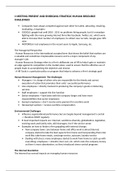Summary
Summary Human Resources Management
- Course
- Institution
Accurate Summary of Managing Human Resources book. 10 first Chapter with pictures, tables, etc. 59 pages. ISBN: 9781292097152. Written in English. Author: Luis R. Gomez-Mejia David B. Balkin
[Show more]



